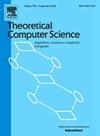A convergence technique for the game i-MARK
IF 1
4区 计算机科学
Q3 COMPUTER SCIENCE, THEORY & METHODS
引用次数: 0
Abstract
The game of is an impartial combinatorial game introduced by Sopena (2016). The game is parametrized by two sets of positive integers , , where . From position one can move to any position , , as long as , as well as to any position , , as long as and divides . The game ends when no more moves are possible, and the last player to move is the winner. Sopena, and subsequently Friman and Nivasch (2021), characterized the Sprague–Grundy sequences of many cases of with . Friman and Nivasch also obtained some partial results for the case . In this paper we present a convergence technique that gives polynomial-time algorithms for the Sprague–Grundy sequence of many instances of with . In particular, we prove our technique works for all games .
游戏i-MARK的收敛技术
i-MARK游戏是Sopena(2016)引入的一种公正的组合游戏。博弈被参数化为两组正整数S, D,其中minD≥2。从位置n≥0,可以移动到任何位置n−s, s∈s,只要n−s≥0,也可以移动到任何位置n/d, d∈d,只要n>;0, d除n。当无法再移动时,游戏结束,最后移动的玩家就是赢家。Sopena和随后的Friman和Nivasch(2021)描述了许多i-MARK(S,D)病例|D|=1的Sprague-Grundy序列。Friman和Nivasch也得到了i-MARK({1},{2,3})的部分结果。本文提出了一种收敛技术,该技术给出了具有|D|>;1的i-MARK的许多实例的Sprague-Grundy序列的多项式时间算法。特别是,我们证明了我们的技术适用于所有游戏i-MARK({1},{d1,d2})。
本文章由计算机程序翻译,如有差异,请以英文原文为准。
求助全文
约1分钟内获得全文
求助全文
来源期刊

Theoretical Computer Science
工程技术-计算机:理论方法
CiteScore
2.60
自引率
18.20%
发文量
471
审稿时长
12.6 months
期刊介绍:
Theoretical Computer Science is mathematical and abstract in spirit, but it derives its motivation from practical and everyday computation. Its aim is to understand the nature of computation and, as a consequence of this understanding, provide more efficient methodologies. All papers introducing or studying mathematical, logic and formal concepts and methods are welcome, provided that their motivation is clearly drawn from the field of computing.
 求助内容:
求助内容: 应助结果提醒方式:
应助结果提醒方式:


